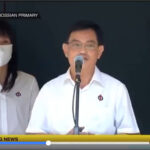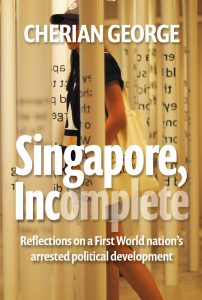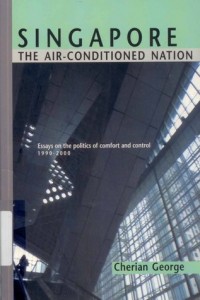THE WEIGHT OF DEMOCRATIC EXPECTATIONS
To depoliticise elections for the Head of State, Singapore needs new institutions such as an Ombudsman.
The Presidential Election has turned into a debate over the role of the Head of State in Singapore’s democratisation process. All four candidates say that the reduction of the PAP’s absolute power is a healthy development. But, they disagree over where the President should position himself in relation to this trend.
On one side is the view that he must keep his distance: voters must decide the direction, pace and depth of change through their choice of MPs – not their choice of President. At the other end of the spectrum are those who believe that Parliament on its own cannot produce the change, provide the voice, or personify the conscience that the public demands. The President, therefore, should weigh in with his moral authority.
The broader, more interventionist notion of the Presidency clearly appeals to many Singaporeans – to the barely concealed alarm of the Government. Tony Tan’s scrupulous adherence to the traditional job specs of the office is its obvious, though undeclared, preference.
It is Tony Tan’s race to lose. He starts off with the strongest name recognition – an important factor in a contest for the attention of 2.3 million voters – and has more resources than any of the other candidates. He probably has enough top-level experience to handle the hard and soft aspects of the job with finesse; and he may well surprise detractors by being enough of his own man, with enough personal pride, not to turn into a puppet president.
However, there are voters who are put off by his closeness to the PAP government. And, he is caught in a trap. He cannot brandish his independent mind during the campaign without saying and doing things that would step out of the persona that he sees as proper should he become President.
The more activist candidates face the opposite conundrum. Their grand flourishes during the campaign make realists wonder how they can possibly live up to their chosen image if they are elected, given the limitations of the job. This is the paradox of Singapore’s curious Presidential system: what candidates need to do to win the post is at odds with the qualities they need to excel in the office.
Heightened expectations
Regardless of who’s elected on 27 August, one intriguing question will linger. How did the race for Singapore’s stately Istana become as raucus as a Hungry Ghost event?
While the candidates have tried to comport themselves with dignity, sections of the electorate are treating the contest as a no-holds-barred bout with authority. It is as if the election is being over-invested with meaning. Choosing the Head of State is a profound enough decision as it is, but to many voters this is also a key opportunity to put the PAP government in its place.
This is becoming a trend. It started with the General Election. It has even affected people’s day-to-day dealings with the public service: the Prime Minister revealed in his National Day Rally speech that hyper-emboldened citizens were making unreasonable demands of frontline staff – mundane interactions were turning into a battle of wills.
Now, the Government fears that people are burdening the Presidency with unrealistic expectations that it should be at the cutting edge of political reform. It’s not just the Government that is wary of this sentiment: the Workers’ Party is giving the contest a wide berth. It knows that the real battle for democratisation is building local government in Aljunied-Hougang and starting the struggle for more Parliamentary seats. Indeed, even a “whale” like Chen Show Mao can probably advance the opposition cause more in his current role as an MP than he could as President.
However, many Singaporeans feel they have been denied a voice for too long and are impatient to see even the office of Head of State play a more active role in Singapore’s reform. Clearly, we are witnessing the unwinding of what Chan Heng Chee had called the “administrative state”, and a repoliticisation of Singapore society.
Singaporeans’ newfound political urges, though, are only half the story. We need to understand why those energies are flowing in the directions that they are. And, the answer must surely be a lack of better channels. Over the decades, the government has systematically closed off or over-regulated the outlets for public grievances normally found in a democratic society, such as the press and political lobby groups. Suppressed public sentiments did not simply dissipate and die off. They built up until the chance came – at election campaigns or over government counters – to release pent-up pressure.
Heartfelt causes that have been denied the freedom to mobilise now latch onto the Presidential Election as an opportunity to promote their agenda. One example is the campaign against the death penalty. Even though the President has no discretionary power in this area, capital punishment has become one of the issues in the campaign. This probably would not have happened if the small, conscience-led movement behind it had been given more space instead of being treated like an enemy of the state.
Thus, what the Government sees as an over-politicisation of the Presidential Election is a symptom of Singaporeans’ frustrated desire for accountability and voice. It is futile telling them that they should take the quarrel elsewhere if there is no elsewhere that the eye can see. The current dynamic is as understandable as it is dysfunctional. And, the solution is as obvious as it is radical: allow the development of democratic institutions strong enough and credible enough to absorb the energies of a repoliticised public.
An old idea whose time has come
One possible new institution is the Ombudsman – a people’s representative who functions as a trusted intermediary between them and the Government. A Scandinavian invention (although some have said that it has precedent in imperial China, where the “Censor” acted as an internal critic of other officials), it has caught on in many countries. It operates under various names: in Britain, it is called the Parliamentary Commissioner for Administration; in Portugal, it is the Provedor de Justica, or Provider of Justice.
The basic idea is the same: to investigate citizens’ complaints from outside of the ministry or agency concerned, thus providing a credible check on government activity. It is most effective when coupled with “open government” initiatives, such as laws guaranteeing access to information.
To say that the introduction of this institution is overdue is an understatement. It was first proposed here by the Constitutional Commission appointed in 1966. The Commission recommended instituting an Ombudsman to ensure an independent check on the acts and decisions of the public sector, apart from the principle of ministerial responsibility. The Ombudsman should have wide powers of investigation and the ability to publish his findings, the Commission said.
The government responded that it was not rejecting the proposal but that it was not yet the right time to institute it. Citizens had not yet developed a clear understanding of their rights and obligations – and many were illiterate, noted Law Minister E.W. Barker in March 1967. Thus, an Ombudsman would be “flooded by complaints by people who do not know what are the limits of his jurisdiction”.
This was a valid concern, but it was not insurmountable. In an editorial on January 4, 1967, the Straits Times had already offered a solution to the anticipated problem of gridlock. The newspaper argued that the office could be set up as a Parliamentary Commissioner, acting only act at the instigation of MPs who felt that they had been unable to make headway with their petitions.
Keeping the idea alive
Over the decades, several respected Singaporeans have tried to revive the proposal. In the late 1970s, opposition leader J. B. Jeyaretnam championed the idea – perhaps guaranteeing that the Government would harden its position against it. In the debate on Nominated MPs in 1989, lawyer Geoffrey Abisheganadan reminded Singaporeans about this piece of unfinished business. In the 1990s, NMP Shrinwas Rai was another such voice in the wilderness. In 2003, respected economist Manu Bhaskaran suggested that an Ombudsman could help check over-regulation of the economy.
These calls did not just come from outside of the PAP Government. In 1990, ambassador-at-large Tommy Koh, then director of the new Institute of Policy Studies, said that Singapore could endure only if some existing institutions were restructured and new ones set up – including that of the Ombudsman.
In 1999, Francis Chong (a President’s Scholar, early online commentator and future civil servant) wrote a letter to the Straits Times urging Parliament to enact a “Good Governance Act” that would establish transparency as the cornerstone of the Government. Chong wanted to empower citizens themselves to act as checks on the public sector. To do this, they would require the right to know the reasons for Government decisions. An Ombudsman would be needed to decide whether requests for information were legitimate. “The potential for injustice is unnecessarily high when bureaucrats can act without giving reasons to the public,” he noted.
Within Parliament, PAP backbencher Davinder Singh asked the Government to institute a Commissioner or Ombudsman to increase the accountability of the public sector. It should have the power to look through ministry files and bring complaints to the top, he said in 1990. In the 1994 Budget Debate, K. Shanmugam, then a backbencher, took up the argument. An Ombudsman would help retain people’s confidence in the system, he said. He elaborated:
“The Minister may say that there are existing channels. However, the existing channels all, by and large, rely on the system itself to act correctly. The proportion of decisions brought to the MPs’ attention and thereafter to the Minister’s attention must be very small. In reviewing the appeal, the Minister will have to rely on the civil servants. We all know that the final decision can often be influenced by the way in which the facts are presented. Ministers’ time must be too valuable for them to spend looking into every aspect or the facts on every appeal by every MP. It is therefore preferable to have an intermediate institution which can provide for a quick and effective remedy, and reserving the final appeal to the Minister for extreme cases. The Ombudsman should have the right to review the facts himself if he feels necessary.”
Getting the politics right
The exact shape of the institution would have to be debated. One issue is whether the Ombudsman should be able to initiate investigations and receive public complaints directly, or act only on the request of one or more MPs (which should keep the office busy enough, now that there is a viable Opposition presence in the House as well as some potentially effective PAP backbenchers). Another issue is whether the Ombudsman’s judgments should be binding, or if he or she should only use moral suasion, through public opinion.
These details are probably less important than the fundamental requirement that the institution be independent and credible. It would have to be headed by a highly respected individual prepared to act doggedly for citizens, not on the side of bureaucratic expediency. It must be backed by the resources to investigate matters and the power to demand information.
Repeatedly since 1967, the Government has insisted that an Ombudsman is not needed because there are already enough feedback channels. In 2011, though, the Government cannot seriously believe that this answer is satisfactory – or even in its own enlightened self-interest. Many Singaporeans evidently desire an Ombudsman-like institution so much that many are prepared to push the Presidency in that direction.
At Thursday’s forum organised by The Online Citizen, I asked Tony Tan if the time had come to develop democratic institutions such as an Ombudsman. He replied that it was certainly an idea that the Government should look at, “as a means for citizens to right their wrongs”. He added, “And although the Government has not agreed to it yet, the Government has to review its position from time to time.”
The Prime Minister was spot on when he said in his National Day Rally speech that Singapore would have to get “get our politics right as well as our policies… and to get both right, you must start with the politics”. Instituting a strong Ombudsman would be a significant step in that direction.







Comments are closed.